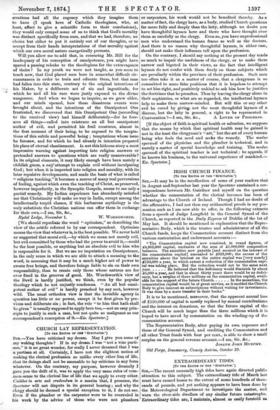CHURCH LAY REPRESENTATION.
ITO THE EDITOR OF THR "SPECTATOR?') Sta,—You have criticised my dream. May I give you some of my waking thoughts? If in my dream I was "not a wise parti- san," it is no great wonder, for really I never dreamed that I was a partisan at all. Certainly, I have not the slightest notion of making the clerical profession so unlike every other line of life, that its doings shall not be amenable to lay criticism in any form whatever. On the contrary, my purpose, however dreamily I gave you the drift of it, was to apply the very same rules of com- mon-sense to the clerical line of life that we apply to every other. -Cuilibet in arie sud credendum is a maxim that, I presume, the Spectator will not dispute in its general bearing ; and why the clergy should be deemed a special exception to it, I do not see. Even if the plumber or the carpenter were to be overruled in his work by the advice of those who were not plumbers
or carpenters, his work would not be benefited thereby. As a matter of fact, the clergy have, as a body, studied Church questions far more fully and deeply than the laity, although no doubt you have thoughtful laymen here and there who have thought over them as carefully as the clergy. Even so, you have unprofessional men who understand the human frame as well as the doctors. And there is no reason why thoughtful laymen, in either case, should not make their influence tell upon the profession.
On the contrary, I should say nothing at the present day tends so much to impair the usefulness of the clergy, or to make them narrow and bigoted in their views, as the fact that intelligent laymen do not confer with them freely on those subjects which are peculiarly within the province of their profession. Such men too often take it as a matter of course, that a clergyman is so committed to some false positions that it is hopeless to attempt to set him right, and positively unkind to ask him how he justifies the doctrines that he preaches. Thus by leaving the clergy alone in their sophistries, or what are so regarded, the intellectual laymen help to make them narrow-minded. But will this or any other evil be cured by giving, not the moat thoughtful laymen of a diocese, but the laity in general, a right to be represented in
[If the object of faith is spiritual health or salvation, we suppose that the means by which that spiritual health may be gained is not in the least the clergyman's "art," but the art of every human being who feels the need and seeks the remedy. The modu* operandi of the physician and the plumber is technical, and is merely a matter of special knowledge and training. The modus operandi of the spiritual teacher is not technical ; he appeals, if he knows his business, to the universal experience of mankind.— ED. Spectator.]


































 Previous page
Previous page